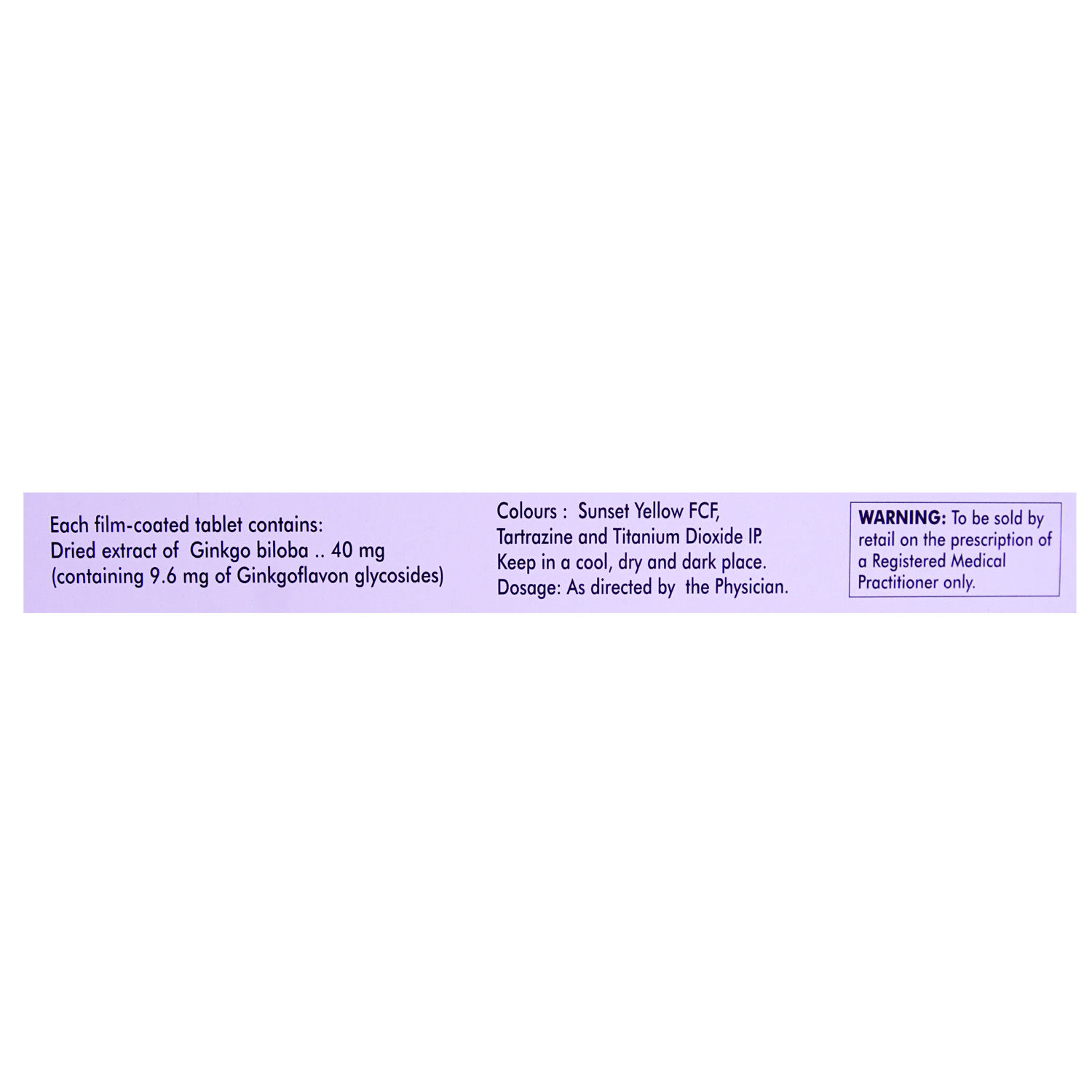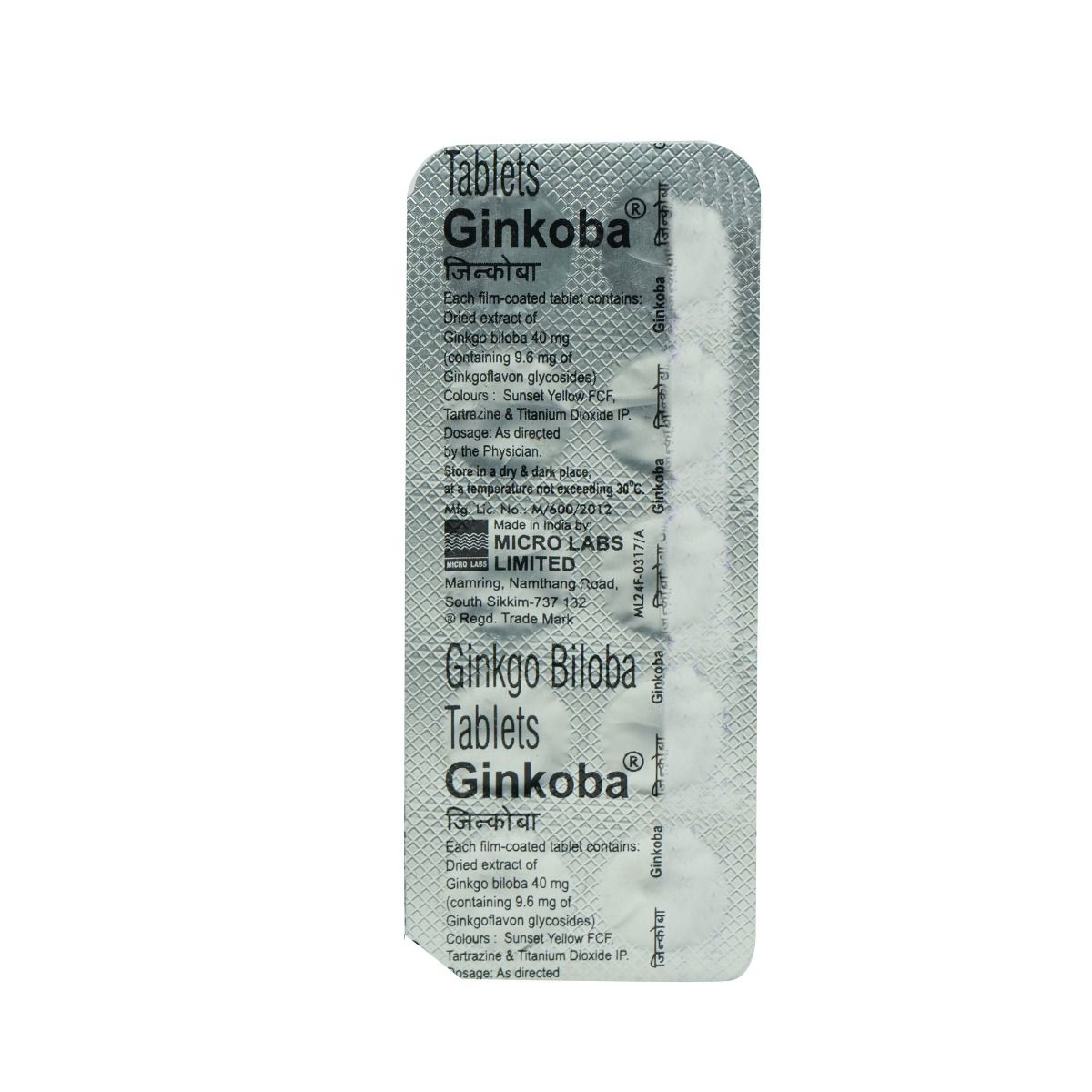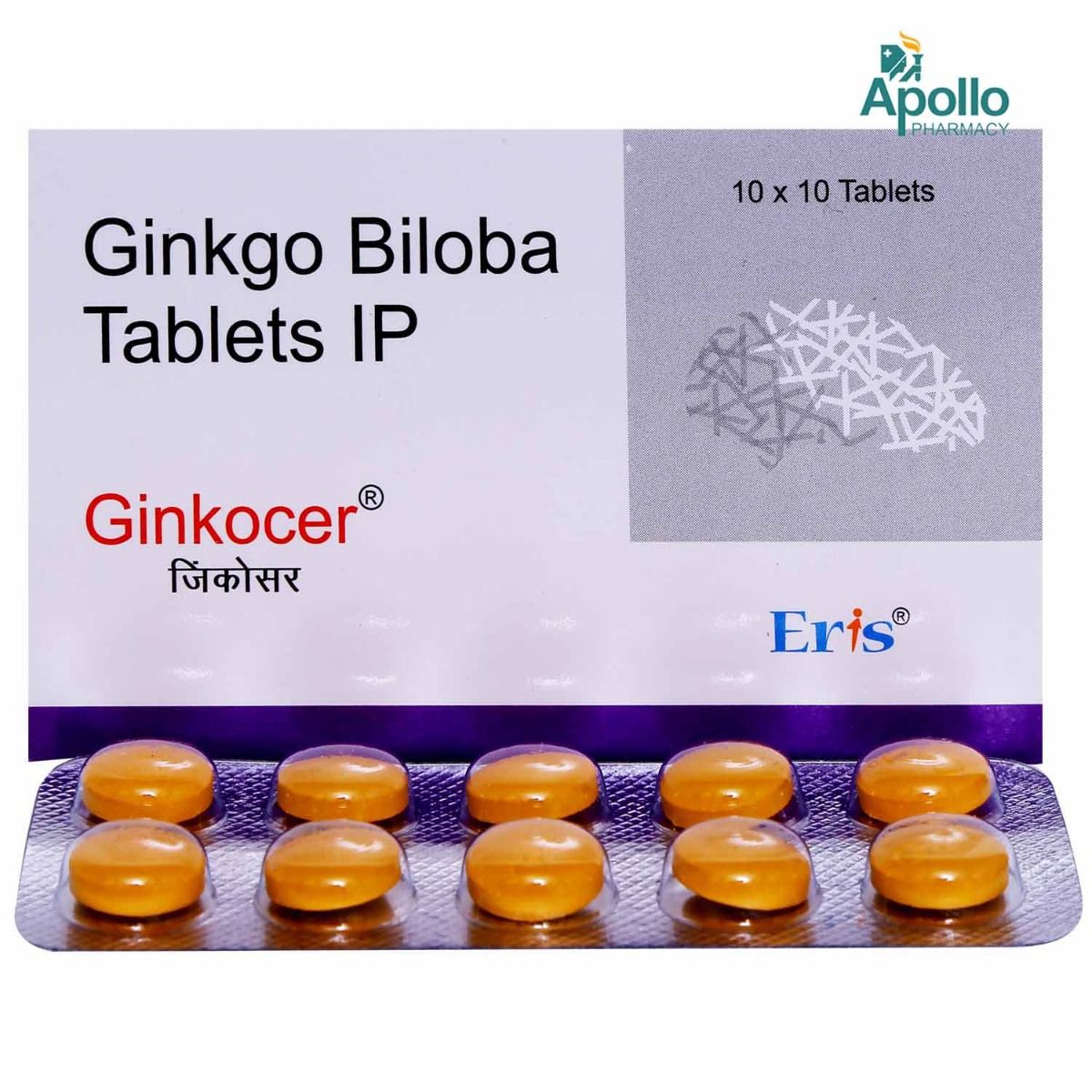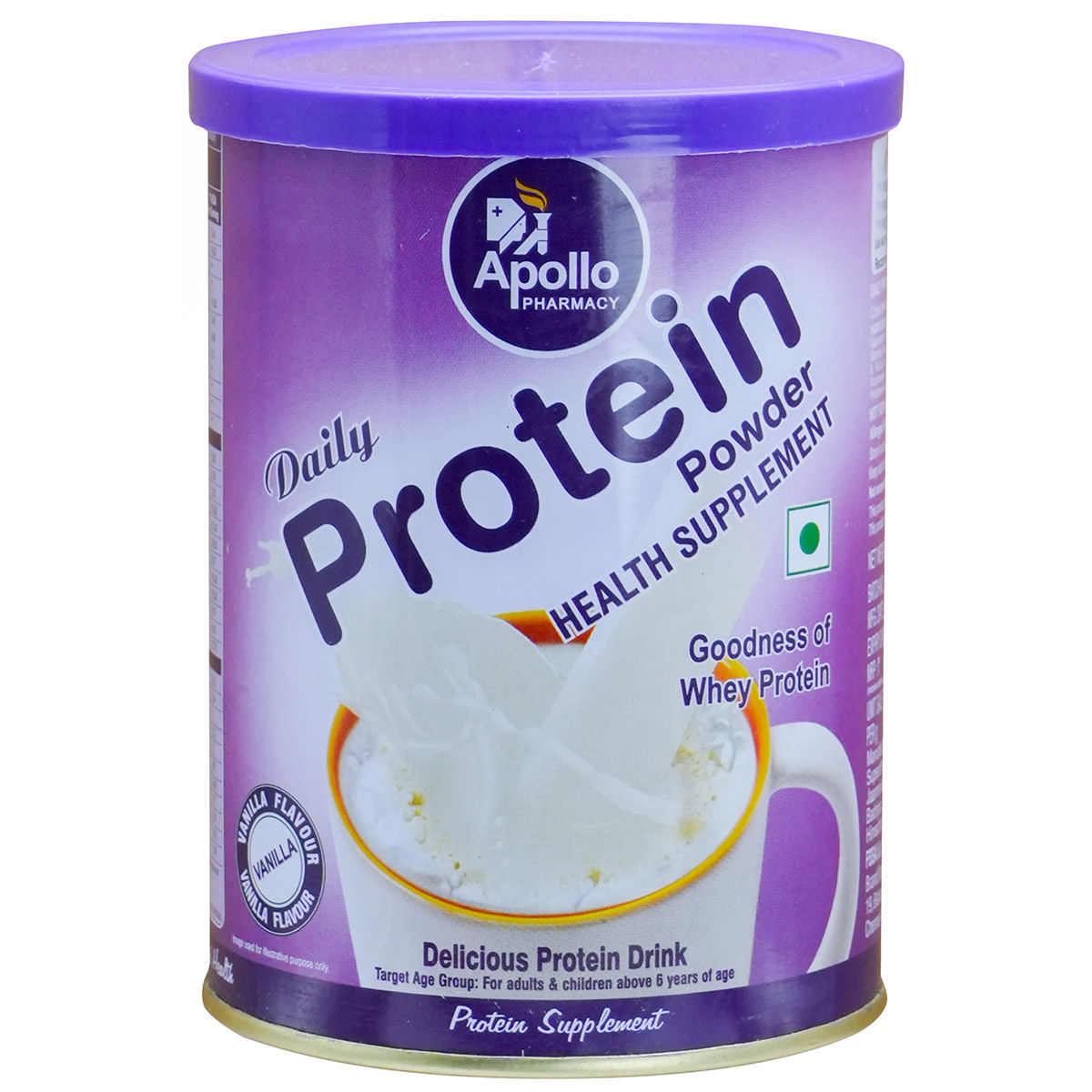Ginkoba Tablet 10's




₹193.5*
MRP ₹215
10% off
₹182.75*
MRP ₹215
15% CB
₹32.25 cashback(15%)
Free Delivery
With Circle membership
(Inclusive of all Taxes)
This offer price is valid on orders above ₹800. Apply coupon PHARMA10/PHARMA18 (excluding restricted items)
Know Your Delivery Time
Provide Delivery Location
Available Offers

Secure Payment

India's Most Trusted Pharmacy

Genuine Products
Composition :
Manufacturer/Marketer :
Consume Type :
Return Policy :
Expires on or after :
About Ginkoba Tablet
Ginkoba Tablet is used to treat dementia, vertigo, and tinnitus. It is also used to treat pain due to poor blood circulation. Dementia is a syndrome (a collection of associated symptoms) characterized by a continuous degradation in brain functioning.
Ginkoba Tablet contains Ginkgo Biloba extract (a herbal product) that contains flavonoids, potent antioxidants, and terpenoids, which help to improve circulation by dilating blood vessels and decreasing platelet stickiness. On the other hand, its powerful antioxidant properties help to protect brain cells from neuronal damage. As a result, Ginkoba Tablet aids in the treatment of dementia, vertigo (spinning sensation), tinnitus (ringing or buzzing in the ears), and claudication (pain due to poor blood circulation).
Take Ginkoba Tablet as advised by a doctor. You may experience stomach distress, headache, dizziness, heart palpitations, stomach upset, constipation, and allergic skin responses. These side effects may differ from one person to another. However, these side effects do not require medical attention and eventually fade. If the side effects don't subside or worsen, consult your doctor.
Avoid Ginkoba Tablet if you have epilepsy or are prone to seizures. Inform your doctor if you have a history of bleeding disorder, Parkinson's disease, diabetes, and fits. Ginkgo biloba is not recommended for use in pregnant women. If you are pregnant, planning to conceive, or are a breastfeeding mother, inform your doctor before starting Ginkoba Tablet . Avoid consuming alcohol along with Ginkoba Tablet . Avoid operating machinery or driving until you feel better, as Ginkoba Tablet may decrease your mental alertness, making you dizzy. Ginkoba Tablet is not recommended for children without a doctor's advice.
Uses of Ginkoba Tablet
Directions for Use
Medicinal Benefits
Ginkoba Tablet contains Ginkgo Biloba extract, a herbal product that contains flavonoids, potent antioxidants, and terpenoids, which help improve circulation by dilating blood vessels and decreasing platelet stickiness. On the other hand, its powerful antioxidant characteristics help protect brain cells from neurological damage. As a result, it can help with dementia, vertigo (spinning sensation), tinnitus (ringing or buzzing in the ears), and claudication (pain due to poor blood circulation).
How Ginkoba Tablet Works
Storage
- Drink water or other clear fluids.
- To prevent worsening of pain, limit intake of tea, coffee, or alcohol.
- Include bland foods like rice, toast, crackers, and rice in your diet.
- Avoid lying down immediately after eating as it may cause indigestion or heartburn.
- Avoid acidic and spicy food as it may cause indigestion.
- Inform your doctor about the nausea and discuss possible alternatives to the medication or adjustments to the dosage.
- Divide your daily food intake into smaller, more frequent meals to reduce nausea.
- Opt for bland, easily digestible foods like crackers, toast, plain rice, bananas, and applesauce.
- Avoid certain foods that can trigger nausea, such as fatty, greasy, spicy, and smelly foods.
- Drink plenty of fluids, such as water, clear broth, or electrolyte-rich beverages like coconut water or sports drinks.
- Use ginger (tea, ale, or candies) to help relieve nausea.
- Get adequate rest and also avoid strenuous activities that can worsen nausea.
- Talk to your doctor about taking anti-nausea medication if your nausea is severe.
- Record when your nausea occurs, what triggers it, and what provides relief to help you identify patterns and manage your symptoms more effectively.
- Preventing Vomiting (Before it Happens)
- Take medication exactly as prescribed by your doctor. This can help minimize side effects, including vomiting.
- Having a small meal before taking your medication can help reduce nausea and vomiting.
- Talk to your doctor about taking anti-nausea medication along with your prescribed medication.
- Managing Vomiting (If it Happens)
- Try taking ginger in the form of tea, ale, or candy to help alleviate nausea and vomiting.
- What to Do if Vomiting Persists
- Consult your doctor if vomiting continues or worsens, consult the doctor for guidance on adjusting your medication or additional treatment.
- Inform your doctor about dry mouth symptoms. They may adjust your medication regimen or prescribe additional medications to manage symptoms.
- Drink plenty of water throughout the day to help keep your mouth moist and alleviate dry mouth symptoms.
- Chew sugar-free gum or candies to increase saliva production and keep your mouth moisturized.
- Use saliva substitutes, such as mouthwashes or sprays, only if your doctor advises them to help moisturize your mouth and alleviate dry mouth symptoms.
- Avoid consuming smoking, alcohol, spicy or acidic foods, and other irritants that may aggravate dry mouth symptoms.
- Schedule regular dental check-ups to keep track of your oral health and handle any dry mouth issues as they arise.
- Inform Your Doctor: Notify your doctor immediately about your diarrhoea symptoms. This allows them to adjust your medication or provide guidance on managing side effects.
- Stay Hydrated: Drink plenty of fluids to replace lost water and electrolytes. Choose water, clear broth, and electrolyte-rich drinks. Avoid carbonated or caffeinated beverages to effectively rehydrate your body.
- Follow a Bland Diet: Eat easy-to-digest foods to help firm up your stool and settle your stomach. Try incorporating bananas, rice, applesauce, toast, plain crackers, and boiled vegetables into your diet.
- Avoid Trigger Foods: Steer clear of foods that can worsen diarrhoea, such as spicy, fatty, or greasy foods, high-fibre foods, and dairy products (especially if you're lactose intolerant).
- Practice Good Hygiene: Maintain good hygiene to prevent the spread of infection. To stay healthy, wash your hands frequently, clean and disinfect surfaces regularly, and avoid exchanging personal belongings with others.
- Take Anti-Diarrheal Medications: If your doctor advises, anti-diarrheal medications such as loperamide might help manage diarrhoea symptoms. Always follow your doctor's directions.
- Keep track of your diarrhoea symptoms. If they don't get better or worse or are accompanied by severe stomach pain, blood, or dehydration signs (like extreme thirst or dark urine), seek medical help.
- Inform your doctor about your constipation symptoms. They may adjust your medication or advise alternative treatments.
- Stay hydrated by drinking sufficient of water (at least 8-10 glasses a day) to help soften stool and promote bowel movements.
- Increase fibre intake by eating foods high in fibre, such as fruits, whole grains, vegetables and legumes, to help bulk up the stool.
- Establish a bowel routine by trying to go to the bathroom at the same time each day to train your bowels.
- Engaging in regular exercise, like walking or yoga, can support in bowel movement stimulation.
- Consult your doctor if constipation persists, and discuss alternative treatments or adjustments to your medication.
- Hydrate your body: Drink enough water to prevent dehydration and headaches.
- Calm Your Mind: Deep breathing and meditation can help you relax and relieve stress.
- Rest and Recharge: Sleep for 7-8 hours to reduce headache triggers.
- Take rest: lie down in a quiet, dark environment.
- Cold or warm compresses can help reduce tension.
- Stay Upright: Maintain good posture to keep symptoms from getting worse.
- To treat headaches naturally, try acupuncture or massage therapy.
- Over-the-counter pain relievers include acetaminophen and ibuprofen.
- Prescription Assistance: Speak with your doctor about more substantial drug alternatives.
- Severe Headaches: Seek emergency medical assistance for sudden, severe headaches.
- Frequent Headaches: If you get reoccurring headaches, consult your doctor.
- Headaches with Symptoms: Seek medical attention if your headaches include fever, disorientation, or weakness.
What if I have taken an overdose of Ginkoba Tablet
Drug Warnings
If you are epileptic or prone to seizures, avoid Ginkoba Tablet . Inform your doctor if you have a history of bleeding disorder, Parkinson's disease, bleeding problems, diabetes, and fits. Ginkgo biloba is not recommended for use during pregnancy. If you are pregnant, planning to conceive, or are a breastfeeding mother, inform your doctor before starting Ginkoba Tablet . Avoid consuming alcohol along with Ginkoba Tablet as it can make you dizzier. Avoid driving or operating machinery until you feel better as Ginkoba Tablet may decrease your mental alertness, making you dizzy. Ginkoba Tablet is not recommended for children without a doctor's advice. Don't eat raw or roasted ginkgo seeds, as it can be poisonous.
Drug-Drug Interactions
Drug-Drug Interactions
Login/Sign Up
Drug-Food Interactions
Drug-Food Interactions
Login/Sign Up
Diet & Lifestyle Advise
Follow a healthy lifestyle as it helps in improving overall health and possibly protects the brain.
Include fruits and vegetables in your diet as they contain antioxidants.
Exercise, meditation and yoga can help lower stress, decrease pain sensitivity and improves coping skills.
Create a bedtime routine as it helps in relaxation and stress reduction.
Limit foods with high cholesterol and saturated fats.
Avoid smoking and alcohol consumption.
Habit Forming
Therapeutic Class
Product Substitutes
Alcohol
Unsafe
Consuming alcohol along with Ginkoba Tablet is not advisable as it may cause unpleasant side effects, or you may become more sensitive to the effects of alcohol.
Pregnancy
Caution
Please consult the doctor. There are no adequate and well-controlled studies on pregnant women. Your doctor will prescribe only if the benefits outweigh the risks.
Breast Feeding
Caution
Consult your doctor, and there is no substantial research yet on the use of Ginkoba Tablet in breastfeeding/nursing mothers.
Driving
Caution
Do not drive or operate machinery if you experience any symptoms that affect your ability to concentrate and react. Seek medical attention if the symptoms persist longer.
Liver
Caution
Limited information is available to use Ginkoba Tablet in patients suffering from liver impairment. Please consult your doctor if you have any concerns regarding using Ginkoba Tablet in patients with liver impairment. Your doctor will prescribe only if the benefits outweigh the risks.
Kidney
Caution
Limited information is available to use Ginkoba Tablet in patients suffering from kidney impairment. Please consult your doctor if you have any concerns regarding using Ginkoba Tablet in patients with kidney impairment. Your doctor will prescribe only if the benefits outweigh the risks.
Children
Caution
Limited information is available for the use of Ginkoba Tablet in pediatric patients. Your doctor will prescribe only if the benefits outweigh the risks.

Have a query?
FAQs
Ginkoba Tablet is primarily used to treat dementia, vertigo, and tinnitus. It is also used to treat pain due to poor blood circulation.
Ginkoba Tablet contains Ginkgo biloba extract that includes flavonoids, potent antioxidants, and terpenoids, which help in improving circulation by dilating blood vessels and decreasing platelet stickiness. On the other hand, its potent antioxidant properties helps to protect the brain cells from neuronal damage. As a result, Ginkoba Tablet aids in the treatment of dementia, vertigo (spinning sensation), tinnitus (ringing or buzzing in the ears), and claudication (pain due to poor blood circulation).
Don't eat raw or roasted Ginkgo Biloba seeds, as they can be poisonous.
It has been demonstrated to reduce tension and improve relaxation. It may even help to improve sleep quality. As a result, it is preferable to take 30-60 minutes before going to bed.
According to research, Ginkgo Biloba may boost mood including alertness and peacefulness in healthy people. It may boost your sense of energy by being more attentive and relaxed.
Ginkgo might interfere with the management of diabetes. You are recommended to closely monitor your blood sugar levels while taking Ginkoba Tablet if you have diabetes.
Country of origin
Manufacturer/Marketer address
Customers Also Bought
Disclaimer
Author Details
We provide you with authentic, trustworthy and relevant information
Recommended for a 30-day course: 3 Strips





















